The Japanese Yen faced a decline against the US Dollar following insights from future Prime Minister Shigeru Ishiba, who emphasized the need for continued accommodative monetary policy. This dovish stance suggests that the Japanese government is keen on maintaining low interest rates to bolster an economic recovery that is still on shaky ground.
Japan’s Retail Trade data for August displayed promising results, with a year-on-year increase of 2.8%, surpassing expectations of 2.3%. This gain also outperformed the revised 2.7% increase from the previous month. Month-over-month figures reflected a seasonally adjusted rise of 0.8%, marking the most significant gain in three months after a modest 0.2% increase in July.
On the other side of the Pacific, the US Dollar encountered pressure following the release of August’s Core Personal Consumption Expenditures (PCE) Price Index data. The figures suggested that the Federal Reserve may be gearing up for a more aggressive approach to interest rate cuts. Currently, markets place a 42.9% chance on a 25 basis point cut in November and a 57.1% likelihood of a larger 50 basis point cut, a rise from earlier expectations.
In Japan, officials voiced their intent to closely monitor economic trends without diving into daily market fluctuations. The Chief Cabinet Secretary highlighted the urgency of assessing both domestic and global economic conditions, stressing the importance of collaboration with the Bank of Japan.
The US Gross Domestic Product rose at an annualized rate of 3.0% in the second quarter, as previously reported. Meanwhile, inflation in Tokyo showed a year-on-year Consumer Price Index (CPI) increase of 2.2% for September, reflecting a slight decrease from August’s figure.
Technical analysis of the USD/JPY currency pair indicates it is trading around 142.20, having broken out of an ascending channel, which shows a potential shift from a bullish to a bearish trend. Support may be found at the 139.58 mark, while upside potential could rise to 143.10 if trends reverse.
